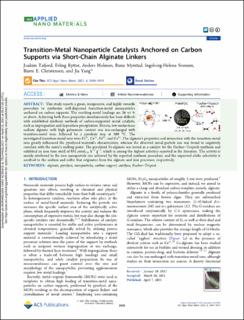Transition-Metal Nanoparticle Catalysts Anchored on Carbon Supports via Short-Chain Alginate Linkers
Tafjord, Joakim; Rytter, Erling; Holmen, Anders; Myrstad, Rune; Svenum, Ingeborg-Helene; Christensen, Bjørn E.; Yang, Jia
Peer reviewed, Journal article
Published version
Permanent lenke
https://hdl.handle.net/11250/2767864Utgivelsesdato
2021Metadata
Vis full innførselSamlinger
- Publikasjoner fra CRIStin - SINTEF AS [5801]
- SINTEF Industri [1565]
Sammendrag
This study reports a green, inexpensive, and highly versatile procedure to synthesize well-dispersed transition-metal nanoparticles anchored on carbon supports. The resulting metal loadings are 26 wt % or above. Achieving both these properties simultaneously has been difficult with established synthesis methods of carbon-supported metal catalysts, such as impregnation and deposition-precipitation. Herein, low-molar-mass sodium alginate with high guluronate content was ion-exchanged with transition-metal ions, followed by a pyrolysis step at 500 °C. The investigated transition-metal ions were Fe3+, Co2+, Ni2+, and Cu2+. The alginate’s properties and interaction with the transition-metal ions greatly influenced the pyrolyzed material’s characteristics, whereas the observed metal particle size was found to negatively correlate with the metal’s melting point. The pyrolyzed Fe-alginate was tested as a catalyst for the Fischer−Tropsch synthesis and exhibited an iron time yield of 885 μmolCO h−1 g−1 , which is among the highest activities reported in the literature. The activity is mainly attributed to the iron nanoparticle size achieved by the reported synthesis procedure, and the improved olefin selectivity is ascribed to the sodium and sulfur that originates from the alginate and iron precursor, respectively.

